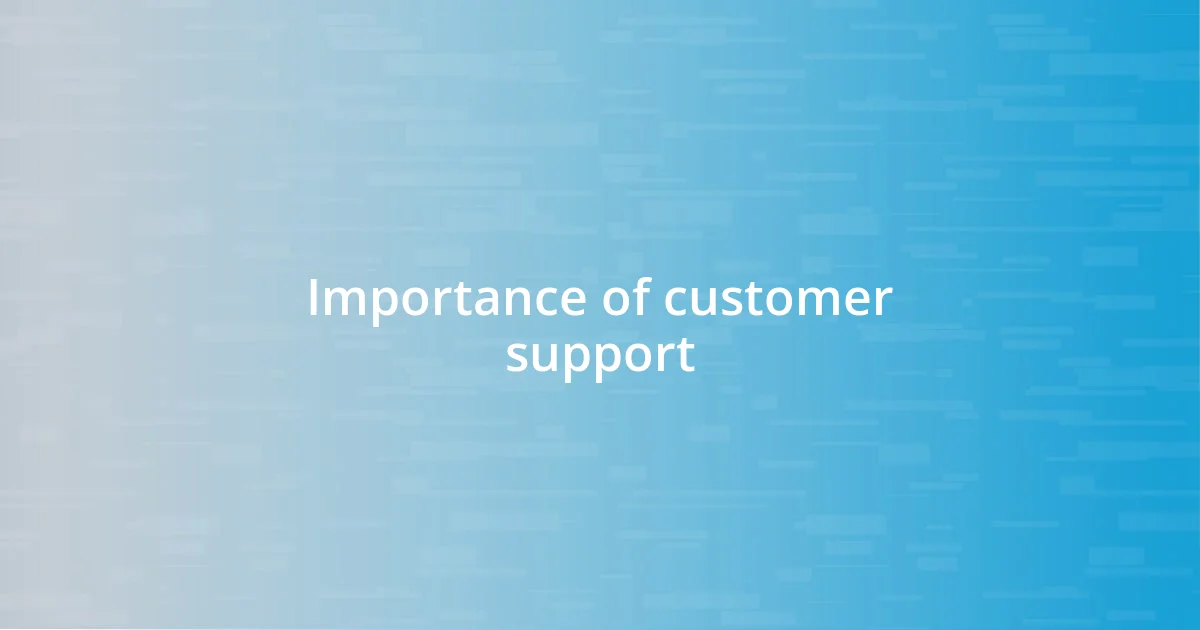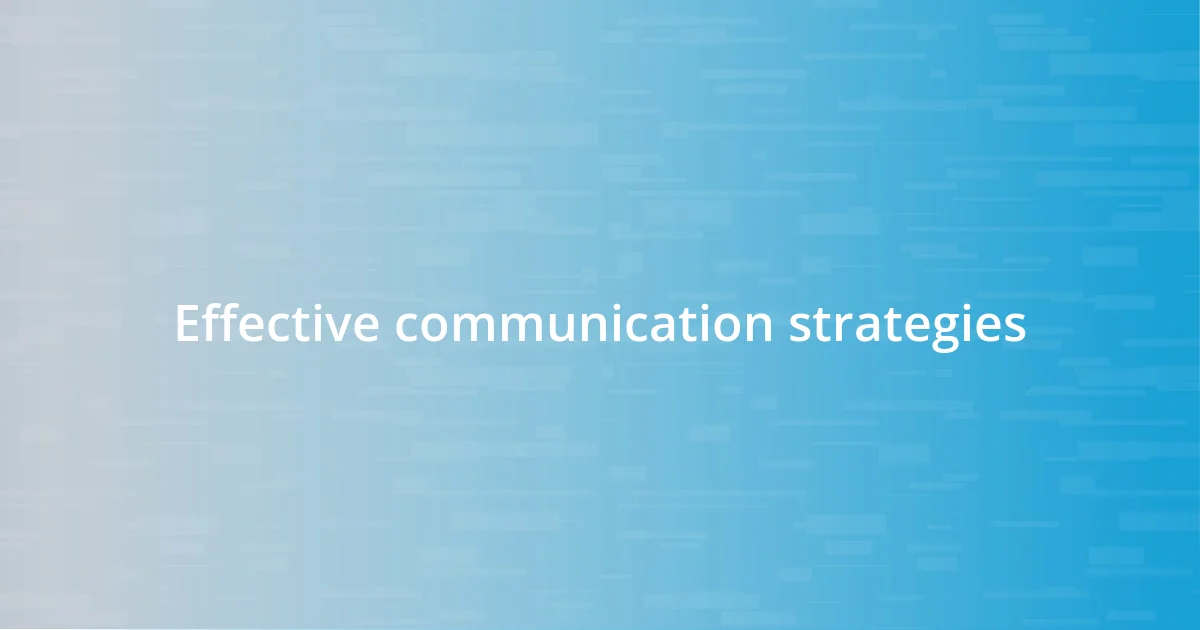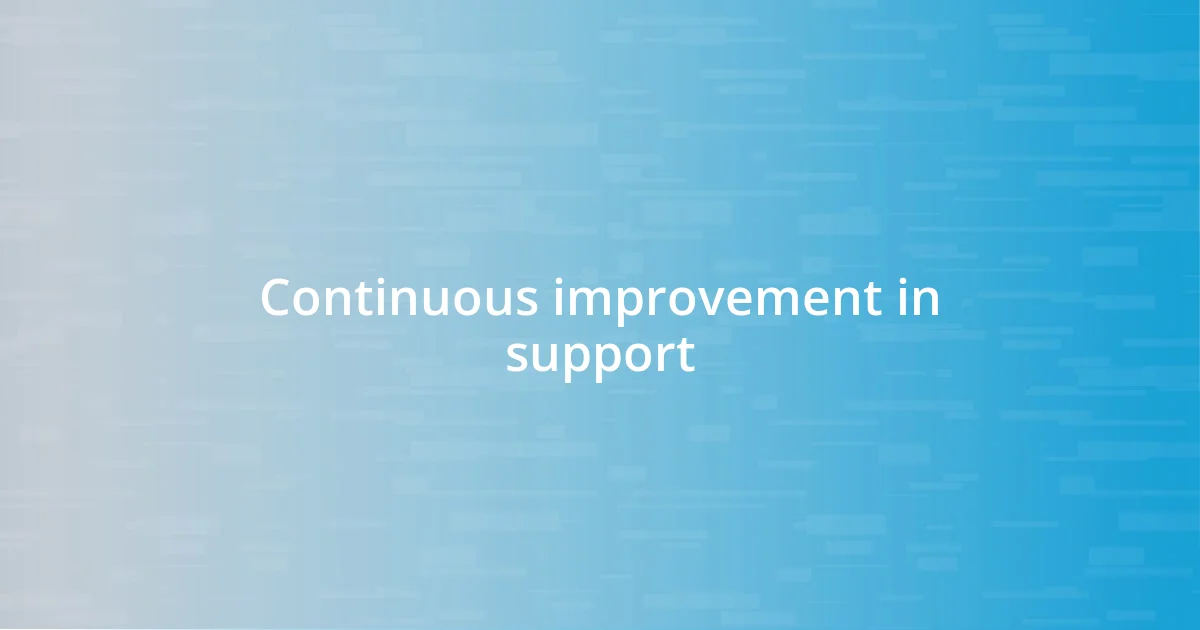Key takeaways:
- Empathy, responsiveness, and knowledge are vital qualities in customer support that can significantly enhance customer experiences and loyalty.
- Effective communication strategies, such as active listening and follow-up, create personal connections and foster positive perceptions of a brand.
- Continuous improvement through feedback and employee training is essential for delivering exceptional customer support, enhancing both service quality and customer trust.

Importance of customer support
Customer support is truly the backbone of any successful business. I’ve always believed that when I have a problem, the way a company responds can either strengthen my loyalty or drive me away. Have you ever had a frustrating experience where you just wanted to be heard? I know I have, and in those moments, a compassionate response can make all the difference.
Consider a time when you faced an issue with a product. I remember reaching out to customer support for a tech gadget I had purchased, and the representative wasn’t just knowledgeable—they empathized with my frustration. That connection transformed my experience from a headache into a moment of relief, reinforcing my trust in the brand. Isn’t it amazing how a simple act of kindness can turn a sour experience into a positive one?
Moreover, effective customer support is essential because it directly impacts a company’s reputation. With social media, a poor interaction can spread like wildfire, often leading to lost customers. Reflecting on my own experiences, I can’t help but think of how many companies have turned potential disasters into success stories just through exceptional service. It makes me wonder: how much could a company triumph in the marketplace if they prioritized their customer interactions?

Key qualities in customer support
When I think about customer support, three key qualities stand out to me: empathy, responsiveness, and knowledge. Empathy is crucial; I remember reaching out to a support team about a late package. Instead of a robotic response, I was met with understanding. The representative genuinely apologized and shared their own experience with delay, making me feel valued.
Responsiveness can make or break a situation. I once contacted a company late at night through a chat feature, and to my surprise, a live agent answered right away! That swift reaction gave me reassurance. It emphasized that the company truly cares about solving my issue when I need help, not just during business hours.
Lastly, knowledge is vital. I’ve encountered representatives who could barely answer my questions, leading to frustration. However, I recall chatting with a support agent about a complex issue, and their deep understanding not only resolved my problem but educated me as well. I walked away feeling empowered, which is what I value most in customer interactions.
| Quality | Explanation |
|---|---|
| Empathy | Understanding customer feelings and perspectives. |
| Responsiveness | Providing quick and efficient replies to customer inquiries. |
| Knowledge | Possessing in-depth understanding of products and services to assist customers effectively. |

Effective communication strategies
Effective communication in customer support is about creating a dialogue rather than just a transaction. One time, I encountered an issue with a subscription service that I relied on. Instead of just emailing back and forth, the support agent set up a quick video call. It felt personal and engaging—like talking to a friend who truly wanted to help. This approach not only resolved my issue faster but also made me feel valued and understood.
-
Active Listening: I appreciate when support agents take the time to truly listen to what I’m saying. For example, a representative once repeated my concerns back to me to ensure they understood. That level of attention made me feel heard.
-
Clear and Concise Language: I value when support representatives speak in plain language, avoiding jargon. I remember a time when a tech support agent explained a complicated issue simply, which demystified the problem for me.
-
Follow-Up: After resolving my issue, I often receive a follow-up message to check in. I recall a company that not only fixed my problem but also reached out a week later to see if I was satisfied. It shows they genuinely care about my experience.
These strategies can transform a mundane interaction into a memorable one, shaping my perception of the brand in a positive light.

Building trust and rapport
Building trust and rapport in customer support starts with authenticity. I remember a recent encounter where the agent didn’t just read from a script. They shared a bit about their own challenges and frustrations as a customer. It felt like a real conversation, not just a transactional exchange, and I could sense their genuine desire to help. How often do we wish for that personal touch? It’s the foundation for trust.
Another vital element is consistency. I had a situation where I contacted a support team multiple times about an ongoing issue. Each representative I spoke with not only recognized my past inquiries but also built on them, providing a sense of continuity. It made me feel like I wasn’t just a number in their system but a valued individual. This consistent communication is crucial in making customers feel understood and respected.
I’ve also learned that small gestures can speak volumes in building rapport. On another occasion, a support agent surprised me by sending a handwritten thank-you note after resolving my issue. It wasn’t something I expected, but it left a lasting impression. Wouldn’t you agree that these simple acts can turn even a mundane interaction into a memorable one? That personal touch not only builds rapport but also fosters a deep sense of loyalty to a brand.

Handling customer complaints effectively
When it comes to handling customer complaints effectively, I truly believe that empathy is the cornerstone. Once, I called a customer service line about a defective product, and instead of launching into scripts or solutions right away, the agent paused to empathize with my frustration. Their acknowledgment not only diffused my irritation but also made me feel like I wasn’t just another issue to be resolved. It was a reminder that, behind every complaint, there’s a person with feelings and real experiences.
I find that swift resolution is also a game-changer. In a recent experience, I reported a billing error to a service I had been with for years. The agent didn’t just promise to look into it; they provided immediate steps for resolution. Within minutes, I had a clear timeline of how and when my money would be refunded. It was refreshing! This level of decisiveness made me feel not just valued, but reassured that my concerns truly mattered to them.
Moreover, transparency during the complaint process is critical. I remember dealing with a tech support team that had no problem admitting when they were unsure of the solution. Instead of sidestepping my questions, they openly communicated that they would need to escalate the issue and keep me in the loop. This honesty cultivated trust and left me feeling like an essential part of the resolution journey. After all, who doesn’t appreciate being treated with respect and kept informed?

Measuring customer support success
Measuring the success of customer support can be both an art and a science. For me, one of the most telling metrics is the Net Promoter Score (NPS). It’s fascinating how a simple question, “On a scale of 0-10, how likely are you to recommend our service to a friend?” can reveal so much about customer sentiment. I recall a time when my favorite software company scored highly with me after a seamless support experience. I eagerly shared my positive feedback because I felt genuinely helped, which made me an enthusiastic advocate.
Another valuable measure is the First Contact Resolution (FCR) rate. I can think back to a frustrating experience with an online retailer; after my inquiry, the representative not only resolved my issue on the first go, but they also followed up to ensure everything was still running smoothly. That single interaction saved time and transformed my perception of the brand. This direct correlation between resolving issues swiftly and customer satisfaction emphasizes how crucial it is to prioritize getting it right the first time.
Additionally, customer satisfaction surveys provide invaluable insights into areas for improvement. I remember filling one out after a recent interaction, highlighting how a particular support agent’s knowledge left me feeling confident in my brand choice. When companies genuinely analyze this feedback, they show that they value customer opinions—and I think that’s a vital aspect of measuring success. Have you ever felt empowered by being asked for your input? It creates a sense of partnership between the customer and the support team, fostering loyalty.

Continuous improvement in support
Continuous improvement is essential in customer support, and I’ve seen it pay off in real-time through proactive initiatives. For instance, I once interacted with a support team that consistently sought feedback after resolving issues. They genuinely wanted to know how the experience went, which felt like an open invitation to contribute to their growth. This made me realize that when companies take feedback seriously, they not only rectify past mistakes but also craft better experiences for future customers.
It’s intriguing to observe how organizations can implement training based on the data collected. During a support call, I learned that an agent had participated in a workshop focusing on problem-solving strategies. The changes in her approach were evident; every suggestion she offered was accompanied by clear reasoning. I couldn’t help but wonder if the training sessions had fostered a culture of growth within their team. This dedication to continuous improvement is what transforms good support into exceptional service.
Another striking example came from a tech company that regularly updated its support materials based on user interactions. After noticing areas where many customers struggled, they created video tutorials that addressed specific pain points. I found it incredibly valuable. When I faced a technical glitch, not only was I able to find a quick fix through their updated resources, but I also felt like they were truly listening to their customers’ needs. Have you experienced that sense of partnership when a company actively works to improve based on your feedback? It builds trust and strengthens the relationship between customers and the support team.











